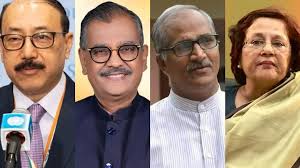Ex-foreign secy, 26/11 prosecutor among four nominated to Rajya Sabha

In a move to enrich Parliament with professional and intellectual diversity, President Droupadi Murmu has nominated four eminent individuals to the Rajya Sabha. The nominations include former foreign secretary Harsh Vardhan Shringla, public prosecutor Ujjwal Nikam, historian Meenakshi Jain, and social worker C. Sadanandan Master. These appointments reflect a blend of diplomacy, justice, academic depth, and grassroots activism.
Harsh Vardhan Shringla: Diplomat in the House
Harsh Vardhan Shringla, a 1984-batch IFS officer, served as India’s Foreign Secretary from 2020 to 2022. He was at the helm during the COVID-19 pandemic and rising global tensions. His tenure focused on India’s outreach in crisis zones like Ukraine and on shaping India’s Indo-Pacific strategy.
He also served as Ambassador to the United States and High Commissioner to Bangladesh. Most recently, he coordinated India’s G20 Presidency. Now, he enters the Rajya Sabha to continue contributing—this time, through lawmaking and national dialogue.
Ujjwal Nikam: A Relentless Voice for Justice
Ujjwal Nikam is one of India’s most respected public prosecutors. He became a household name during the 26/11 Mumbai terror trials. He prosecuted Ajmal Kasab, the lone captured terrorist, and secured a death sentence.
Over his career, Nikam has handled over 20 high-profile criminal cases. These include the 1993 Bombay bombings and the murders of Pramod Mahajan and Gulshan Kumar. He received the Padma Shri in 2016 for his service to the nation.
In 2024, he contested the Lok Sabha elections from Mumbai North Central on a BJP ticket but lost. His Rajya Sabha nomination now gives him a platform to influence justice policy and national security debates.
Meenakshi Jain: History Through a Scholarly Lens
Dr. Meenakshi Jain is a renowned historian known for her research on Indian civilization and culture. A Padma Shri awardee, she has written several books that explore themes of continuity and tradition in Indian history. Her works include “Rama and Ayodhya” and “The Battle for Rama.”
She taught history at Gargi College, Delhi University, for many years. Her voice in Parliament will likely enrich discussions on education, heritage, and cultural identity.
C. Sadanandan Master: Courage from Kerala
C. Sadanandan Master, a social worker from Kerala, is a symbol of resilience. In 1994, he survived a brutal political attack that left him without both legs. Despite this tragedy, he continued to work for his community and contested elections in 2016 and 2021.
His nomination brings the voice of marginalized communities and victims of political violence to the national stage. It is also a powerful recognition of his unwavering commitment to service.
A Constitutional Privilege
These nominations were made under Article 80(1)(a) of the Indian Constitution. It allows the President to nominate 12 Rajya Sabha members with expertise in literature, science, art, and social service. The four recent nominations fit this purpose well, offering a wide spectrum of experience.
A Step Toward a Thoughtful Parliament
These individuals represent excellence in their fields. Shringla brings strategic insight from global diplomacy. Nikam offers legal experience rooted in high-stakes justice. Jain contributes deep knowledge of India’s cultural and historical context. And Master offers a voice grounded in courage and service.
Their presence in the Upper House can enhance debates and policymaking. More importantly, it adds diversity—not just of background, but of thought and lived experience.
Conclusion
The Rajya Sabha is designed to be a chamber of thoughtful deliberation. With the inclusion of Harsh Vardhan Shringla, Ujjwal Nikam, Meenakshi Jain, and C. Sadanandan Master, it gains fresh perspectives rooted in real-world service and expertise. These nominations reinforce the idea that Parliament should reflect not just political strength, but intellectual and moral integrity as well.






